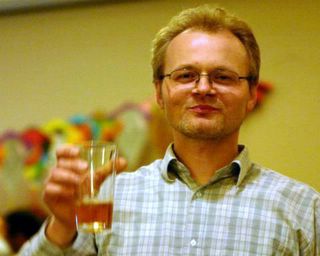WUI (Writing under the influence)
 Somebody once said we are all Americans, sometimes born in the wrong places.
Somebody once said we are all Americans, sometimes born in the wrong places.On a warm autumn day in 1986, while enjoying beer with my college buddies,
I decided to join my new homeland.
I've come to appreciate the ideals that helped create this great country.
Liberalism, political-correctness, multiculturalism and moral equivalence
are destroying it.
This old house Grovenet Wal*Mart Visiting Poland American wine better than French.
Wednesday, August 31, 2005
Communists of the world, be gone!

.
Today is a special anniversary worth some contemplating:
On August 31, 1980 the ruling Communists signed an agreement with the protesting workers in Gdansk. That summer the Solidarity movement was created as a result of the nation's solidarity towards the common oppression. But at that time -- only ten years after a tragedy in Gdansk when several protesters were killed by the secret service -- no one was sure if the Communist regime would refrain from using violence against the people.
The rest is history, as they say.
I've been somewhat disappointed that after the fall of Communism people have voted ex-Communists back into power. But this is changing. This fall could be a very important turning point in Polish history when Communists are forever separated from power:
Some 15 years after the anti-communist revolution, Poles are turning to the right. This year is politically the most important in the new history of this young democracy.
Poland's future depends on the next coalition of parties in power. But only one significant party seems to understand a free-market economy. This is the PO - Citizenship Platform (www.platforma.org), whose leadership includes free-market liberals from Gdansk.
I found this article especially interesting because it explained to me how wrong my father is. He is very involved in local politics as the president of a chapter of the League of Polish Families (LPR) that, although Euroskeptic, is anti-capitalist.
I have to talk to my father about it again. But from the few conversations we've already had, it's clear to me that he believes in high taxes and dislikes private business owners because their motives are purely economical. What my father doesn't seem to understand is that self-interest is what makes the US such an economic power. The only positive attribute of LPR is that the same values that make it anti-capitalist also make it very socially conservative. Those values, of course, come from the teachings of the Catholic Church, which in Poland is still very strong. Those same teachings are also responsible for the fall of Communism. The Warsaw Voice says as much in this article (registration required):
World leaders coming to Gdansk to remember Solidarity
Warsaw, Poland August 31, 2005
Poland is in the midst of the 25th anniversary of the founding of the Solidarity labor movement, which set off a chain of events that toppled communism throughout the Soviet Block.
Among the events scheduled are a mass at the Gdansk shipyard, where leader Lech Walesa and fellow workers created Solidarity. Foreign leaders due to attend include EU Commission head Jose Manuel Barroso and German President Horst Koehler.
Solidarity was officially recognized on August 31, 1980 and was the first free trade union in the former Soviet Bloc. Within months of its establishment, Solidarity became a national political movement with 10 million members. Nine turbulent years later, Solidarity leaders negotiated the end of communism and a few months later, the Berlin Wall fell.
An open-air mass at the gate of the Gdansk shipyard will be the highlight of three days of celebrations. Up to 20 heads of state are expected to join Solidarity members and former activists at the ceremony on Wednesday morning, to be led by the Archbishop of Krakow.
The mass marks the role played by the Roman Catholic Church in toppling communism, particularly that of Poland's Karol Wojtyla, then newly elected as Pope John Paul II.
Other celebrations will include street fairs and concerts throughout Poland.
So if LPR manages to win substantial numbers of votes it could play an important role in the new coalition, which, I hope, will have PO as the majority party with PiS following as the (distant?) second.
Archives
October 2004 November 2004 December 2004 January 2005 February 2005 March 2005 April 2005 May 2005 June 2005 July 2005 August 2005 September 2005 October 2005 November 2005 December 2005 January 2006 February 2006 March 2006 April 2006 May 2006 June 2006 July 2006 August 2006 September 2006 October 2006 November 2006 December 2006 January 2007 February 2007 March 2007 April 2007 May 2007 June 2007 July 2007 August 2007 September 2007 October 2007 November 2007 December 2007 January 2008 February 2008 March 2008 April 2008 May 2008 June 2008 July 2008 August 2008 September 2008 October 2008 November 2008 December 2008 January 2009 February 2009 March 2009 April 2009 May 2009 June 2009 July 2009 August 2009 September 2009 October 2009 November 2009 December 2009 January 2010 February 2010 March 2010 April 2010 May 2010 June 2010 July 2010 August 2010 September 2010 October 2010 November 2010 December 2010 January 2011 February 2011 March 2011 April 2011 May 2011 June 2011 July 2011 August 2011 September 2011 October 2011 December 2011 January 2012 February 2012 March 2012 April 2012 May 2012 June 2012 August 2012 September 2012 October 2012 November 2012 January 2013 February 2013 March 2013 May 2013 July 2013 September 2013 October 2013 November 2013 December 2013 January 2014 March 2014 April 2014 May 2014 June 2014 July 2014 August 2014 September 2014 October 2014 November 2014 December 2014 May 2015 September 2015 November 2015 December 2015 March 2016